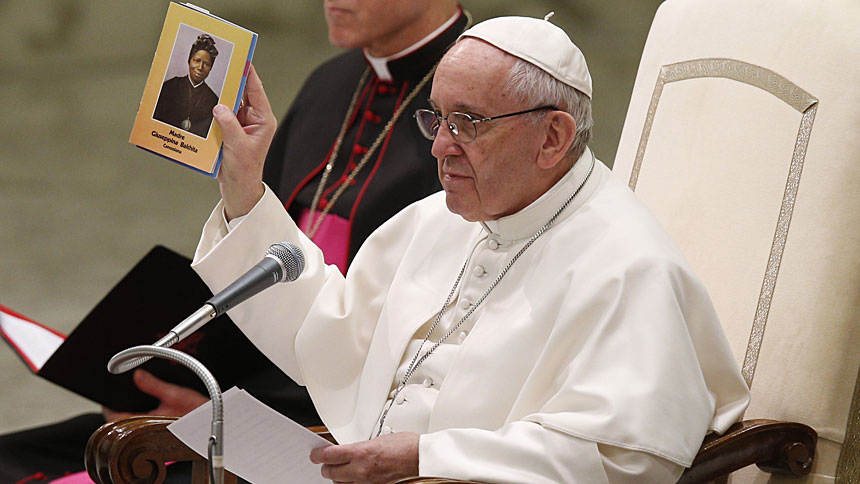
“The Catholic Church intends to intervene in every phase of the trafficking of human beings; she wants to protect them from deception and solicitation; she wants to find them and free them when they are transported and reduced to slavery; she wants to assist them once they are freed.”
– Pope Francis, Address to Participants in the World Day of Prayer, Reflection and Action against Human Trafficking, 2018
One of the most hidden and vulnerable populations our Church is called to accompany and protect are women, men, and children subjected to human trafficking. Also referred to as modern-day slavery, this illicit industry generates over 150 billion dollars a year by compelling human beings to perform backbreaking labor or engage in commercial sex acts. Contrary to public perception, these brothers and sisters of ours are not only trapped through physical force, yet also many times by insidious schemes such as fraud and coercion. In other words, traffickers’ prey upon the vulnerable with false promises of a better life, threat of harm or death against their loved ones, withholding identify documents, tricking them into thinking they owe more debt, and more.
Our baptismal call to promote human dignity teaches us that every life is a gift from God and sacred, and as such, deserves to be protected and nurtured. Human trafficking—where men, women, and children are bought and sold like merchandise—inherently rejects this principle, showing absolute contempt for the human condition. Thus, the Second Vatican Council’s Pastoral Constitution on the Church in the Modern World denounces all conditions where people “are treated as mere tools for profit rather than free and responsible persons” as “infamies” and a “supreme dishonor to the creator”.
The elimination of human trafficking is a priority issue of the Catholic Church. We can turn to the Church’s most recent papal leaders for guidance. Pope John Paul II, Pope Benedict XVI, and Pope Francis have each publicly decried trafficking in persons, calling for its eradication and for the protection of survivors. Pope Francis has spoken with particular urgency about our responsibility as Catholics and people of good will to not look the other way. Archbishop Bernadito Auza, former representative of the Holy See at the United Nations, clearly delineates Pope Francis’ message which urges us to be present to and take action against this crime:
- Human trafficking is a crime that is happening in our local communities
- Root causes are economic, environmental, ethical, and political in nature
- Trafficking takes advantage of a widespread culture of indifference and exclusion
- Now is the time for action against modern-day slavery
- Action must involve everyone
The good news is that as the Vatican – as well as the U.S. Bishops, and our country’s religious sisters – amplify their cry against what Pope Francis describes as “a wound against contemporary society,” a growing number of Catholics are anxious to become involved in its eradication. There are a multitude of options available for each and every one of us to get started today:
Pray: Observe February 8th when Catholics around the world are encouraged to host or attend prayer services on the International Day of Prayer and Awareness against Human Trafficking. February 8 also coincides with the Feast Day of St. Josephine Bakhita. St. Bakhita’s trajectory from years of cruel enslavement in Sudan to freedom in Italy led her to experience the love of God through Christ and to become a shepherd for many others. Join us as we partner with the John J. Brunetti Human Trafficking Academy at St. Thomas University College of Law for an online morning prayer service, survivors’ panel, and mass!
Grow in Awareness: Read and reflect upon the Pastoral Orientations on Human Trafficking, a publication authored by the Migrants and Refugees Section of the Vatican. These guidelines offer an in-depth reading and comprehension of modern-day slavery to serve as encouragement to Catholic anti-trafficking ministries.
Engage: Help your parish, diocese, or community group become involved in local anti-trafficking efforts! The ‘Become a SHEPHERD’ resources from USCCB contain an array of materials to help you with awareness raising and direct engagement through service and advocacy.
Questions on how to build or expand upon your parish or diocese’s anti-trafficking ministries? Please contact us at mrstraff@usccb.org. We are here to help you!
Hilary Chester, PhD is the Associate Director for Anti-Trafficking Programs, US Conference of Catholic Bishops/Migration and Refugee Services.
Lisa Lungren, MA is the National Outreach Coordinator, Immigration and Anti-Trafficking, US Conference of Catholic Bishops/Migration and Refugee Services.
Learn more about USCCB’s Anti-Trafficking programs and efforts at https://www.usccb.org/topics/anti-trafficking-program.

